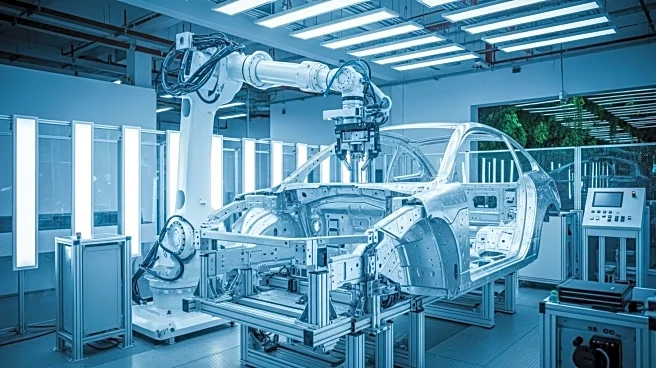What's Happening?
BMW has inaugurated a new AI-powered car factory in Debrecen, Hungary, marking a significant milestone in its global production network. This facility is the first fully fossil-free site within BMW's operations, integrating advanced AI technologies such as the AIQX quality platform, autonomous transport systems, and real-time data analytics. The factory will commence production of the all-electric BMW iX3, a model that represents the forefront of BMW's Neue Klasse series, which is set to influence the company's future vehicle designs and technologies. The site is equipped with nearly 1,000 robots and an adjacent EV battery plant, emphasizing BMW's commitment to sustainable and efficient manufacturing processes.
Why It's Important?
The opening of BMW's AI-driven factory in Hungary is a pivotal development in the automotive industry, showcasing the potential of AI to enhance production efficiency and sustainability. By operating entirely without fossil fuels, the factory sets a new standard for environmentally conscious manufacturing, aligning with global efforts to reduce carbon emissions. This initiative not only strengthens BMW's competitive edge in the electric vehicle market but also reinforces Europe's position as a hub for innovative industrial practices. The integration of AI technologies promises to improve quality control and streamline logistics, potentially reducing production costs and increasing output efficiency.
What's Next?
BMW plans to implement the AI technologies used in the Debrecen factory across its other production sites, starting with its Munich plant. This expansion will likely enhance the company's global manufacturing capabilities, further embedding AI into its operations. The factory's focus on producing the Neue Klasse series indicates a strategic shift towards electric vehicles, which could influence market trends and consumer preferences. As BMW continues to innovate, other automotive manufacturers may follow suit, adopting similar AI-driven and sustainable practices to remain competitive.
Beyond the Headlines
The establishment of BMW's AI-powered factory in Hungary highlights broader implications for the automotive industry, including ethical considerations surrounding AI's role in manufacturing. The reliance on AI for quality control and logistics raises questions about the future of human labor in these processes. Additionally, the factory's fossil-free operation sets a precedent for other industries to pursue sustainable practices, potentially accelerating the transition to renewable energy sources. This development may also influence regulatory policies, encouraging governments to support green investments and technological advancements.









